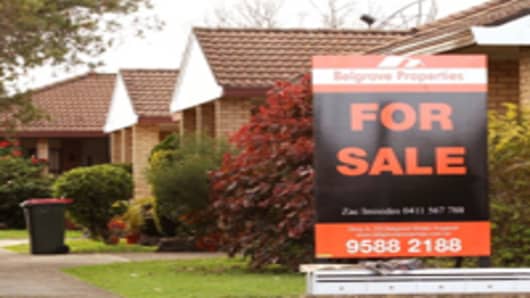Australia's home prices rebounded by one percent month on month in June as the effect of recent interest rate cuts kicked in, but prices in major cities are still down by almost 5 percent since the highs of 2011, and analysts warn the days of pricey valuations may be over.
In the past decade house prices in some cities have grown close to 10 percent annually, leading to a wave of borrowing against home valuations to finance everything from holidays, to investments, to boats, cars and retirement needs.
But Westpac Bank Chief Executive Gail Kelly told a meeting of business leaders in Brisbane earlier in June that the era of high home valuations driving personal wealth was over "for good."
Reserve Bank of Australia Governor Glenn Stevens echoed her comments in a June speech in Adelaide. He said that the trend of the previous decade, when house prices drove large increases in personal wealth, was "unsustainable."
Despite the gain in June home prices are still down 1.2 percent nationally since January, and have fallen 5.3 percent in the 12 months from May 2011, according to research firm RP Data.
Shane Oliver, Chief Economist at AMP Capital in Sydney, says house prices in Australia are overvalued by 13 percent, down from an overvaluation peak of 33 percent in 2005. The median house price in Sydney, for example, is A$637,000, while in Los Angeles it is US$325,000, with both currencies roughly at parity, says Oliver.
He adds that external factors like a hard landing in China could lead to a crash in housing prices in Australia. "To trigger a collapse you really need something which threatens the ability of Australians to service their mortgages, and the biggest risk to that is not domestic, it is international and that is the risk of a collapse in the Chinese economy," Oliver told CNBC.
China is Australia's largest trade partner and the consumer of most of its resources. The slowdown in the Chinese economy has people worried about its impact on the Australian economy, which grew a robust 4.3 percent year on year in the first quarter of 2012.
But other analysts warn that the main risk to the property market is domestic. If a large number of investors, many of them on the verge of
retirement, get frustrated with poor capital appreciation of their investment properties and move to sell, it could exert significant downward pressure on the market.
A homeowner in Sydney tells CNBC that he had put up his inner-city townhouse for sale a month ago at an asking price of A$1.55 million, but finally had to sell it at a discount of over 8 percent.
"I started off asking A$1.55 million, but eventually had to accept A$1.42 million, and there goes most of the profit I was counting on for my retirement," the 45-year-old self-employed Sydney resident said.
According to Simon Pilcher, a property agent in Sydney, the market is
still tentative. "There are some people apprehensive and nervous about
what the future may hold, but I don't think there is any particular
reasons for that," Pilcher told CNBC.
Angie Zigomanis, Senior Manager at property research and forecasting firm BIS Shrapnel, predicts a further uptick in the housing market starting from the end of the year. He is forecasting the overall recovery will be led by the resource-rich states of Western Australia, Queensland and the Northern Territory.
"We don't see that Australia will have the 30 percent declines that we saw in the U.S. property market and also parts of Europe," Zigomanis said.
So rather than prices falling, the forecaster believes prices in Western Australia would show the most growth, rising 22 percent in the next three years, while Sydney - still the most expensive market - would recover to post gains of 17 percent.


